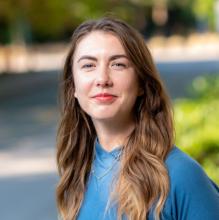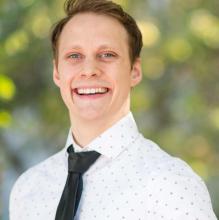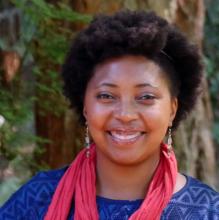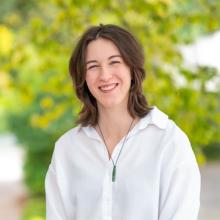Wahl, Kate
Combining implementation science, public policy research, and critical health scholarship has convinced Kate of the ethical imperative of involving patients in healthcare work and policy making. Working with citizen researchers to develop impactful stories that policy makers can act upon, Kate hopes her work will result in the new policies that are responsible and responsive to citizen needs and demands.
Research Description
My dissertation asks: How do patient stories affect government health policymaking, and how can stories be used by researchers to share evidence about health with government? These questions are motivated by emerging, interdisciplinary knowledge about evidence-based policymaking. First, implementation science research shows that the success of complex system-level health interventions depends on contextual factors that may affect the desired outcomes. Second, public policy research indicates that current strategies for communicating evidence to policymakers (e.g. rapid reviews) do not sufficiently account for the role of values, heuristic thinking and other political and pragmatic factors in policymaking. Finally, critical health scholarship suggests that giving voice to citizens in health research is an important ethical imperative. Stories, which help audiences prioritize, understand and recall information, present a potential method for generating local evidence, translating evidence to policymakers effectively, and bringing the citizen voice into health research. Therefore, my research aims to 1) Develop a theoretically and empirically informed model of how stories affect health policymaking, 2) Apply the storytelling framework to experiences of family planning care in BC, including co-design workshops with citizen researchers to develop the results into stories for policymakers, and 3) Evaluate the impact of the stories on health policymakers.
What does being a Public Scholar mean to you?
I am honoured to be a public scholar. To me, being a public scholar means I am part of a movement to bring together diverse ways of understanding the world and creating and sharing knowledge to tackle wicked problems. It means welcoming the opportunity to learn from others, and bringing my research and analytic training to bear in service of common social goals.
In what ways do you think the PhD experience can be re-imagined with the Public Scholars Initiative?
The Public Scholars Initiative aims to support graduate students in the development of not only knowledge and skills, but also in their connection to a larger context and sense of purpose beyond the academy. This can feel daunting, but the network of students, faculty and others who are part of the PSI creates an environment that fosters the exploration rigorous scholarship in new settings and creative forms. Building an extra-disciplinary home for mutual thinking, learning, and support is one important way the PhD experience is being reimagined with the PSI.
How do you envision connecting your PhD work with broader career possibilities?
I have been lucky to design a PhD that aligns with my career goal of bridging academic, policy, and public spaces. Working with diverse collaborators allows me to be grounded in the real world and tailor my research for their knowledge needs and preferences. I hope that these experiences will set the foundation for intersectoral work following my PhD, in a context where I can apply my theoretically grounded, methodologically pluralistic, and ecologically focused training to make a purposeful social contribution.
How does your research engage with the larger community and social partners?
A core goal of my research is to connect health policy makers with the reproductive and sexual healthcare experiences of the larger community.
Why did you decide to pursue a graduate degree?
Before beginning my graduate studies, I spent four years at the Princess Margaret Hospital as a clinical research analyst. Working in that environment gave me the practical skills I needed to implement research and helped me realise the potential of research to drive social action. I decided to pursue a graduate career to build the knowledge, skills, and professional identity to ask and answer action-oriented research questions in partnership with community.
Why did you choose to come to British Columbia and study at UBC?
Early in my training, I realised that researchers can play an important role in ensuring that new knowledge gets into the hands of people who can use it to improve health outcomes. I decided to focus my doctoral research on the development of new methods for generating and sharing evidence with patients, practitioners, and health policy makers. UBC is the perfect fit for this work because of its unique commitment to supporting scholarship that advances the public good through collaboration with partners outside of the traditional university setting. I am especially lucky to be supervised by Drs. Sarah Munro and Wendy Norman, who are experts in the science and practice of promoting the uptake of research findings related to women’s health.
What is it specifically, that your program offers, that attracted you?
I completed my MSc in the School of Population and Public Health because it offered the foundation in statistics and epidemiology that is necessary to understand and conduct health research. As a PhD student in the Reproductive and Developmental Sciences program, I benefit from a multidisciplinary training environment that gives me the privilege of learning from both clinical researchers and basic scientists about issues in women’s health. The program also offers the flexibility to pursue a diversity of learning opportunities that support my development.
For you, what was the best surprise about graduate life, about UBC or life in Vancouver?
The best surprise about UBC was the breadth of opportunities that the school offers to its graduate students. Within the first two years of my training, I was both a mentee and a mentor, became a member of the Women’s Health Research Institute and Women's Health Research Cluster, adjudicated the Multidisciplinary Undergraduate Research Conference, participated in the 3 Minute Thesis competition, and completed training to become an Associate of the Center for the Integration of Research, Teaching and Learning. Each of these experiences provided me with skills that surpass traditional graduate education and better equip me to generate and mobilize knowledge within and outside of academia.
What aspects of your life or career before now have best prepared you for your UBC graduate program?
The practical training I received as a clinical research analyst before coming to UBC best prepared me for my graduate studies by helping me understand the real-world applications of what I was learning.
Do you have any tips for students from your home country coming to Canada / to UBC Grad School?
Bring a growth mindset to your graduate experience! Now is a great time to explore challenges, take intellectual risks, and learn to capitalize on setbacks. Knowing that not everything will go according to plan, remember that your colleagues will be there to support your development and advancement.



